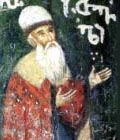GOCHA KUCHUKHIDZE # 8
ON THE GENESIS OF THE “TRIAD” BY ILIA CHAVCHAVADZE
Vakhushti Bagrationi (1696-1757), a Georgian geographer and historian, regarded as the main basis for the maintenance of the integrity of a state its ruling by a single king, sole monarchy (ertmepoba) and also explained what was necessary to attain this. In his words, three basic features were always characteristic of united Georgia: “the first: If you ask anyone – a Kartlian or an Imeretian, a Meskh, a Her or a Kakhetian: “What is your confession?” – he will reply at once: - “Georgian”; the second: all of them have a common alphabet, created by King Parnavaz, and a single language…the third: no churches or monasteries, precious icons and crosses can be found anywhere bearing the names of kings except: “We – King of Georgia”, which is the same as “King of Kartli”, or “King of Abkhazia” …
Thus, according to V.Bagrationi, the first basis for the preservation of sole monarchy is a single faith. Kartlians, Imeretians, Meskhs, Hers answer the question “What is your confession?” in a similar way: “Georgian” (being in this case synonymous with Christian). The second basis is the Georgian script and language. V.Bagrationi regards the integrity of western Georgia (Abkhazia) and the eastern Georgia as the third basis.
Ilia Chavchavadze (1837-1907), a Georgian prose writer, poet and publicist, canonized for the great national activities, considered the preservation of the territory/land (mamuli), language and faith as the three necessary bases for the survival of the nation and the restoration of the statehood (Tshavtshavadze 1927: 26).
In the present author’s view, this is a laconic expression of the idea found with V.Bagrationi. I.Chavchavadze did not mention the alphabet, for the preservation of the language implies that of the alphabet as well. Speaking about taking care of the territory, he certainly implied the protection of its integrity too (I.Chavchavadze used the Georgian word mamuli sometimes as a synonym of homeland, and in other cases as a word denoting the territory of the country).
According to V.Bagrationi, these bases served as the foundation for the Georgian statehood in other periods too. As is known in scholarship (Sulava 2003: 23), Georgian writer Giorgi Merchule (10th c.) also touched on the question of the territory, language and faith: “Georgia is reckoned to consist of those spacious lands in which church services are celebrated and all prayers said in the Georgian tongue” (Writings 1964: 290).
The land, language and faith of the Georgians are regarded as the main basis for the survival of the nation in The Martyrdom of St. Habo Tbileli by Ioane Sabanisdze (8th c.) too. Exactly the association with these three concepts helped Habo Tbileli to embark on the right path: “When he arrived in Georgia he lived with Duke Nerses…and he learnt to read and write and converse freely in Georgian. Then he started to acquire and read the holy books of the Old and the New Testaments” - relates Sabanisdze (Writings 1964: 57). The writer wished to demonstrate that if these three concepts
Obviously, the thesis concerning the three bases had existed for centuries, being in the process of transformation, until I.Chavchavadze offered its clear formulation.
In the present author’s opinion, it is not doubtful that I.Chavchavadze was familiar with the thesis on the three main bases originated many centuries before.
The idea about the three bases existed not only in written form but probably in oral form too in people; About the three bases, of course would be discussed in church and kingdom circles, before about it had been written in books. . . It would not be difficult for Ilia Chavchavadze to find the main necessities which is needed for saving of nation . . . but in this case he should use from Vakhushti Bagrationi.
Ilia Chavchavadze appears as the person who evoked the ideas which were behind and gave to people for the next period. These words became more popular by the end of 80ies of XX century, then in the life of Ilia Chavchavadze.
Bibliography:
Chavchavadze1927: - Ilia Chavchavadze, complete unit, exhibition of Pavle Ingorokva and Al. Abasheli, IV, Tbilisi, 1927.
Sulava 2003: - N. Sulava, Spiritual Mission of Grigol Khanzteli, - Literary Researches, XXIV, Tbilisi, 2003.
Vakhushti 1941: - Vakhushti Bagrationi, Description of Georgian kingdom (geography of Georgia), Tbilisi., 1941;
Writings 1964: - The old Georgian hagiographic Writings, I, prepared for exhibition by I. Abuladze, N. Goguadze, L. Kajaia, Ts. Kurtsikidze, Ts. Chankievi, Ts. Jghamaia by leading and publishing
 |

